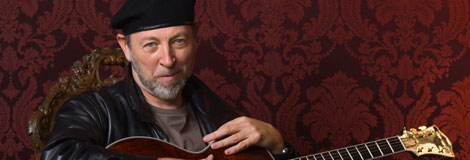Richard Thompson Live at the Barbican
Playboy magazine could never have seen it coming. It was 1999 when Los Angeles’ most hallowed of cultural monthly publications sought the recommendations of renowned musicians in order to compile the definitive list of the ‘10 greatest songs of the millennium’. Of all the contributors and all the contributions to this supreme register of musical art, only Richard Thompson, the peerless standard bearer of British folk music, took them literally.
The result of Thompson’s considerations was a catalogue of songs that, whilst being unabashedly ignored by Playboy’s editors, became the foundation of a live show quite unlike any other. A Thousand Years of Popular Music is, in essence, a chronological tour (de force) through just about every genre of music that has been plucked, blown, bowed, beaten and harmonised since the Battle of Hastings.
This particular show at the Barbican included, amongst others, such household favourites as 13th century bard ballads, Elizabethan madrigals, Italian cathedral songs, religious carols, opera, African-American spirituals, 19th century colliery choir laments, musical hall sing-alongs, Gilbert & Sullivan, Cole Porter and the Great American Songbook, Chicago jazz, country and western, rock ‘n’ roll, ’60s psychedelia, ’80s pop and, as is customary on such occasions, Nelly Furtado.
It is clear however that Thompson is not only a most diligent student of musical history but that his often-overlooked skills as a live performer are also considerable. His stage persona and crowd pitter-patter, reminiscent of the awkwardly eccentric and nerdy art teacher that wears tie-dye and drives a rusting Mini Cooper (we all had one), is as bizarrely British as it is entertaining.
‘I thought I’d start in AD 1000 with a toe-tapping little number by St Godric’ recalls Thompson. For those Londoners whose knowledge of Dark Age monastic plain chant is not what it should be (shame on you), the compositions of St Godric are believed to be the oldest surviving English-language songs set to music.
Yet despite the rather opaque and indecipherable nature of many of these songs, the show never lagged or stuttered. Supported by Debra Dobkin on traditional folk drumkit and Judith Owen on piano and vocals, Thompson succeeded in bringing alive ancient stories and legends in an enchantingly accessible manner.
He prefaced each song with its explanation and translation, thereby embracing and including the audience in what could otherwise be a rather self-indulgent affair. This was most notable on Ja Nuls Hom Pris, written by none other than Richard the Lionheart in 1290, So Ben Mi Ca Mon Tempo by Vecchi in 1590 and When I Am Laid in Earth from Purcell’s 1690 opera Dido and Aeneas.
The second half of the show was more recognisable. My God larks Thompson, ‘is it the 20th century already?’ Julie London’s Cry Me a River was the showstopper and neatly revealed Thompson’s mastery of the guitar (a recent poll by Rolling Stone magazine placed Thompson in the top 20 guitar players of all time).
Finishing the show with raucous versions of Abba’s Money, Money, Money, the Beatles’ I Wanna Hold Your Hand and an idiosyncratic take on Nelly Furtado’s Maneater, Thompson, in receiving the resultant standing ovation, looked every bit as pleased as the crowd did. He may believe that he is ‘unqualified to sing 98% of these songs’, but the audience did not care.
Richard Thompson appeared at:
The Barbican Centre
Silk Street
EC2Y 8DS
Tel: 020 7638 8891
He returns to London later in the year.





